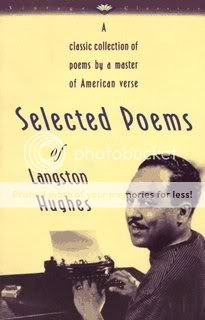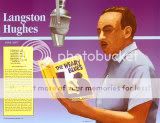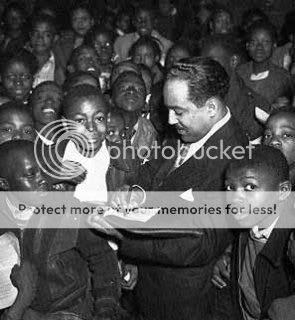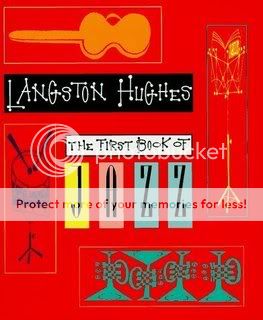Poetry Wednesday 06/17/09: The Fusion of Jazz and Poetry
Jazz and the blues were a great influence on the poetry of Lanston Hughes (1902 – 1967).
He was one of the first American poets to experiment with these distinctly American musical forms created by black people. While Langston was living in France in 1923, he worked washing dishes at a club.
He was swept away at the sounds of jazz and the blues, which inspired him to write poems in his head as he scrubbed. He heard jazz and blues live at clubs and on the radio. The force of this exuberant music inspired him to create new poetic forms.
He took the rhythms and sound of jazz and incorporated that playfulness and spontaneity into the language of his poems. He also borrowed from the blues, a musical form that utilizes repetition and treats sad themes in humorous ways. He performed and recorded his poetry with legendary jazz musicians such as bassist Charles Mingus.
.
Jazz Makes Me Sing
by Langston Hughes
Jazz makes me sing
and swing
but the blues
is my muse
Jazz grabs me
by the collar and
makes me holler
It spins me around
beating in my bones
like a heart full of sound
Jazz hypnotizes me
with its blooblop
deblee blooblop deblam
Ooh weee, that blooblop
deblee blooblop
deblam
The blues celebrates
the bruised with
sad stories and
funny-sounding news
It makes me think
about my sadness
and how I ain’t alone
Yeah, it makes me
think about my sadness
and how I ain’t alone
The blues makes me feel
a whole lot better
it hits my heart in
the funny bone.
 Born in Joplin, Missouri, James Langston Hughes was a member of an abolitionist family.
Born in Joplin, Missouri, James Langston Hughes was a member of an abolitionist family.
He was the great-great-grandson of Charles Henry Langston, brother of John Mercer Langston, who was the first Black American to be elected to public office, in 1855.
Hughes attended Central High School in Cleveland, Ohio, but began writing poetry in the eighth grade, and was selected as Class Poet.
His first published poem was also one of his most famous, “The Negro Speaks of Rivers”, and it appeared in Brownie’s Book. Later, his poems, short plays, essays and short stories appeared in the NAACP publication Crisis Magazine and in Opportunity Magazine and other publications.
Langston was one of the first American poets to seccessfully capture and use jazz, the blues, and common speech in his poems. He also celebrated people who normally were not written about: the poor, the working class, and people of the street.
Below is a poem entitled, “Poetry Means the World to Me”, where he mentions other references to jazz as his inspiration.
Poetry Means the World to Me
by Langtson Hughes
Poetry means the world to me
It’s how I laugh and sing
how I cry and ask why
Poetry comforts me
when I use jazz or
the blues or the way
regular folks talk –
the language
they use
Words don’t always
have to be neat
and polished
like a statue
They should be
used used used
to say what you like
or don’t like
what you see think
or feel-
Words to fight against
hate and unnecessary
suffering
Poetry is what I use
to say
I love you.

Langston Hughes received a scholarship to Lincoln University, in Pennsylvania, where he received his B.A. degree in 1929. In 1943, he was awarded an honorary Lit.D by his alma mater; a Guggenheim Fellowship in 1935 and a Rosenwald Fellowship in 1940. Based on a conversation with a man he knew in a Harlem bar, he created a character know as My Simple Minded Friend in a series of essays in the form of a dialogue. In 1950, he named this lovable character Jess B. Simple, and authored a series of books on him.

Langston Hughes was a prolific writer.
In the forty-odd years between his first book in 1926 and his death in 1967, he devoted his life to writing and lecturing.
He wrote sixteen books of poems, two novels, three collections of short stories, four volumes of “editorial” and “documentary” fiction, twenty plays, children’s poetry, musicals and operas, three autobiographies, a dozen radio and television scripts and dozens of magazine articles.
In addition, he edited seven anthologies. The long and distinguished list of Hughes’ works includes: Not Without Laughter (1930); The Big Sea (1940); I Wonder As I Wander” (1956), his autobiographies. His collections of poetry include: The Weary Blues (1926); The Negro Mother and other Dramatic Recitations (1931); The Dream Keeper (1932); Shakespeare In Harlem (1942); Fields of Wonder (1947); One Way Ticket (1947); The First Book of Jazz (1955); Tambourines To Glory (1958); and Selected Poems (1959); The Best of Simple (1961). He edited several anthologies in an attempt to popularize black authors and their works. Some of these are: An African Treasury (1960); Poems from Black Africa (1963); New Negro Poets: USA (1964) and The Best Short Stories by Negro Writers (1967).
Langston Hughes died of cancer on May 22, 1967. His residence at 20 East 127th Street in Harlem, New York has been given landmark status by the New York City Preservation Commission. His block of East 127th Street was renamed “Langston Hughes Place” . Here’s another poem entitled, “The Weary Blues”, which was set to jazz by various musical artists.
The Weary Blues
by Langston Hughes
Droning a drowsy syncopated tune,
Rocking back and forth to a mellow croon,
I heard a Negro play.
Down on Lenox Avenue the other night
By the pale dull pallor of an old gas light
He did a lazy sway ….
He did a lazy sway ….
To the tune o’ those Weary Blues.
With his ebony hands on each ivory key
He made that poor piano moan with melody.
O Blues!
Swaying to and fro on his rickety stool
He played that sad raggy tune like a musical fool.
Sweet Blues!
Coming from a black man’s soul.
O Blues!
In a deep song voice with a melancholy tone
I heard that Negro sing, that old piano moan–
“Ain’t got nobody in all this world,
Ain’t got nobody but ma self.
I’s gwine to quit ma frownin’
And put ma troubles on the shelf.”
Thump, thump, thump, went his foot on the floor.
He played a few chords then he sang some more–
“I got the Weary Blues
And I can’t be satisfied.
Got the Weary Blues
And can’t be satisfied–
I ain’t happy no mo’
And I wish that I had died.”
And far into the night he crooned that tune.
The stars went out and so did the moon.
The singer stopped playing and went to bed
While the Weary Blues echoed through his head.
He slept like a rock or a man that’s dead.
The Weary Blues
by Langston Hughes
performed by The Cab Calloway Orchestra
Below is a more modern version of The Weary Blues.
Washington Musica Viva presents an adaptation of “The Weary Blues,” the 1958 collaboration between Langston Hughes and Charles Mingus. Poetry by Langston Hughes, original music by Charles Mingus and new music by Charles Gerard.
Holly Bass, reader; Pepe González, bass; John Kamman, guitar; Chris Royal, trumpet; Carl Banner, piano; Charley Gerard, alto saxophone; and Harold Summey, drums.
Performed in the Langston Room at Busboys and Poets in Washington DC on Wed Jan 23rd, 2008.
This segment contains:
1. Hey! (Gerard)
2. The Weary Blues (Gerard)
3. Blues At Dawn (Gerard)
.

Hughes wrote this brief tribute to jazz in 1955.
In it, he discusses the music’s history and highlights its greatest heroes as well as its various forms.
A useful, simplified introduction to the history of jazz and its techniques, with capsule profiles of musicians such as Louis Armstrong and Bix Beiderbecke.
Link back to the Poetry Wednesday tour on Laurita’s page
[mp3j track=”outofthisworldjohncoltrane.mp3″]
|
instrumentalpavilion wrote on Jun 15, ’09
Thanks Laurita. I may have some Jack Kerouac posted soon….Jack reciting his poetry over jazz music.
Fred |
|
sugarpiehuny wrote on Jun 15, ’09
great post thanks
http://sugarpiehuny.multiply.com/journal/item/195/The_Winds_of_Fulfillment… |
|
lauritasita wrote on Jun 15, ’09
instrumentalpavilion said
Fred, leave a link to it here. I’m sure many people would love to read that, including me ! Laurita
|
|
instrumentalpavilion wrote on Jun 15, ’09
lauritasita said
I sure will. Fred
|
|
sanssouciblogs wrote on Jun 15, ’09
This is wonderful, I’ll have to come back!
|
|
caffeinatedjo wrote on Jun 16, ’09
lauritasita said
I like the way he said that…straightforward and right to the point. I was not familiar with this poet. Gonna’ check out some more of his stuff.
|
|
bostonsdandd wrote on Jun 17, ’09
I LOVE it! Thank you so much for paying homage to a great avenue of art.
|
|
instrumentalpavilion wrote on Jun 17, ’09
Thanks again Laurita! Fred
|
|
lauritasita wrote on Jun 17, ’09
I’m so glad you guys like this !
|
|
forgetmenot525 wrote on Jun 21, ’09
you’ve written about this guy before, i remember, its really nice to learn more of him and hear more of his stuff……..thanks laurita
|


 I may have some Jack Kerouac posted soon….Jack reciting his poetry over jazz music.
I may have some Jack Kerouac posted soon….Jack reciting his poetry over jazz music. 
Comments
Poetry Wednesday 06/17/09: The Fusion of Jazz and Poetry — No Comments
HTML tags allowed in your comment: <a href="" title=""> <abbr title=""> <acronym title=""> <b> <blockquote cite=""> <cite> <code> <del datetime=""> <em> <i> <q cite=""> <s> <strike> <strong>